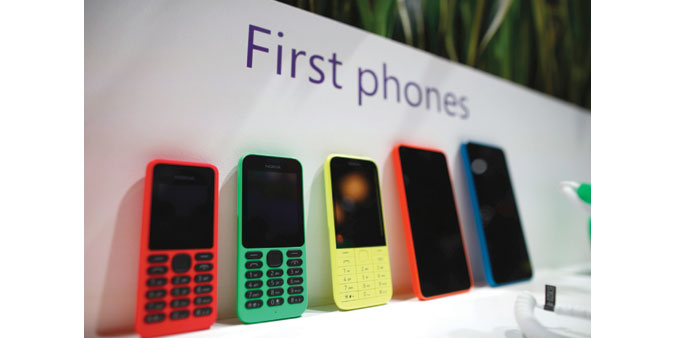A range of Nokia Lumia mobile handsets displayed in the Microsoft Corp pavilion at the Mobile World Congress in Barcelona (file). InterDigital lost an eight-year battle to claim patent royalties on Nokia phones, now made by Microsoft.
Bloomberg
Washington
InterDigital lost an eight-year battle to claim patent royalties on Nokia phones, now made by Microsoft Corp.
The devices don’t infringe patents related to ways that control how mobile phones make calls, the US International Trade Commission said in a notice posted Friday on its website. It rejected InterDigital’s request to block US imports of the Nokia-branded phones. The case was filed in August 2007 before Nokia Oyj sold its handset business to Microsoft.
In finding that there was no violation of InterDigital rights, the commission didn’t address the broader issue of whether InterDigital offered to license its patents on fair and reasonable terms. A trade judge in April found that Microsoft wasn’t willing to take any license, no matter what InterDigital offered.
InterDigital, which has 200 researchers and gets almost all of its revenue from patent-licensing, has sued companies that refused to pay royalties. It contends that its inventions are an essential component of standardised 3G and 4G wireless technologies.
InterDigital fell more than 4% on the news in trading after the close of New York trading. The shares ended at $49.46, down less than a%, during regular trading hours.
“Today’s decision is disappointing but is expected to have a limited impact on our going-forward business, given the decline of the Nokia mobile device business under Microsoft’s control and its limited market position,” said William J Merritt, chief executive officer of InterDigital.
The company will continue to seek compensation for past infringement, he said.
Microsoft argues that InterDigital is misusing its patents to try to extract unreasonably high royalty payments. It filed an antitrust lawsuit August 20 over what it called InterDigital’s “abusive licensing practices and unlawful monopolisation.” “We’re grateful the Commission stopped InterDigital from trying to block our products,” David Cuddy, a Microsoft spokesman, said in a statement. “We’ll continue to pursue our separate suit addressing InterDigital’s unlawful conduct and abusive patent licensing scheme.”
Espoo, Finland-based Nokia, which has taken legal positions in other cases that would support InterDigital’s royalty arguments, didn’t join Microsoft when it comes to the issue of royalty demands.
Instead, it’s said that it didn’t infringe the patents and wouldn’t be subject to any import ban because it no longer makes the handsets.
The case has become a flashpoint in a global debate over how to value patents on the fundamental ways modern electronics work and talk to each other.
Companies that get together to create the standards for things like Wi-Fi pledge to license any patents on reasonable terms, to balance out their advantage in ensuring their inventions get included in the standard.
Historically, industry standard-setting boards had been content to let companies figure out among themselves any royalty disputes.
That’s created tension as the market shifts because those who pioneered the mobile-phone market are no longer making them.
It has split the technology industry, with InterDigital siding with Qualcomm, which gets most of its revenue from licensing, as well as Nokia and Ericsson AB. Microsoft’s position is backed by Apple, Hewlett-Packard Co and Intel Corp.
Even regulators are having trouble coming up with a single position. US Federal Trade Commission Chairwoman Edith Ramirez, a Democrat, filed documents with the ITC arguing that the trade judge was wrong in his analysis.

